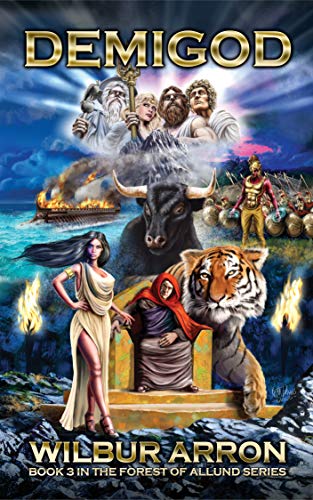On a world similar to Ancient Greece is a place of mystery and intrigue, The Forest of Allund. In that forest the caretaker Mage Alexio Sopholus, and his animal friends guard their privacy and their land against threats from within the kingdom and from without. Forced to rely on his own means to guard his forest, Alexio must fight a constant series of battles against those who seek nothing less than to destroy forest and all in it.
Process for world-building by Wilbur Arron
Being a retired Professional Engineer, I insist on a well thought out setting in which any story takes place. If you cannot believe the setting, you will not buy into the story. This is what I find is the major fault with modern Science Fiction, Fantasy, and Super Hero stories and movies. The setting has to make sense and I am a hard sell.
I first start with the laws of physics, chemistry, and engineering. I am real leery about violating these laws. Here are two examples:
Example 1. Faster than light travel.
We all know that according to Einstein’s Theory of Special Relativity, travel through space-time is limited to the speed of light. Star Trek gets around this by having space-time travel through you. This is the principle of Warp Drive, and there is nothing in physics that says there is a speed limit to this technique, or that it cannot be done.
Example 2. Magic Use
Despite what you hear, you cannot magically create mass out of nothing. You cannot create energy at all. To have a 150 kg monster appear or disappear requires energy shifts that are greater than high yield nuclear weapons. But it is magic you say. Correct, but it still operates in the real world and therefore obeys the real-world laws.
My next greatest gripe is you have to believe in the setting of the story. Your characters and the other creature around them have to make sense. Let us take the old science fiction series Space 1999. In that series, the premise is, that due to the explosion of nuclear waste, the moon is accelerated to high speed. I say this because they tend to visit new worlds every week. Besides the fact the creatures they meet all look like us and speak perfect English, I have a problem with them getting there in the first place. To accelerate something like the moon to near warp speed would take a power source like the sun. Any such power release would vaporize the moon (and most likely the earth) or crush it under the high g-loads of the acceleration. Therefore the premise of the whole series was bogus and after the first episode, I never bought into it or watched it.
So I start my world-building with a blank sheet of paper and I start putting ideas down. The physical setting of the planet is very important. You need to make yourself familiar with geology to know why the earth looks like it does. If there are mountains, why are they there? What caused them to form? If it is a desert world, then where is all the water? Remember oxygen and hydrogen are some of the most common elements in the universe, you expect water almost everywhere. Deep valleys are caused by something making them. You need to first plot the physical setting and why it is there as your start. Of course, if you put your story on earth or a planet like earth, the job becomes simpler.
The next thing is what creatures do you populate it with. Again using earth creatures in the past or present is a good start since they obviously are, or were, alive here. If you want to do something novel, you better have a good idea of why these creatures exist. It may be nice to have a flying dragon as big as a 747 to liven things up, but do you know the power and the aerodynamic force needed to keep a 747 up. The dragon will need to generate similar strength forces to do the same. Just having something there to give the character(s) grief is not good enough. Ask yourself: what is their place in the ecosystem; where did they evolve from, why do they look the way they do. If you can show rational choices for all these questions, you are on your way to having a good setting.
Unless your character(s) are alone on a planet like Robinson Caruso, you now need a society your story must take place in. Societies do not develop a series of laws and customs just for kicks. There is a reason why they act the way they do. This is why knowing history is a good idea. In my stories, I use a world similar to Greece of the Third Century B.C.E. It is a period I know well from my own private studies. I use their laws, their morality, and their science to construct my world. I throw in a few kickers of my own, but always so they are acting within the cultural norm that society would tolerate. If you want to do something out of the box, fine, but you need to plot a reason why. I start with developing a history of the society. Laws and customs develop because of past events and people’s reactions to them. A classic of this technique is the novel Dune by Frank Herbert. He plotted a major history for his characters and society going back several thousand years. His society makes perfect sense. In fantasy work, you have to look no further in Tolkien, who not only plotted Middle Earth’s history but the languages they spoke as well. You do not have to be this extreme. but the better you make your world, the more the reader will want to stay in it.
Again, physics, geology, biology, evolution, sociology, history, and economics all come into play when making a world. You do not have to have these things worked out in exquisite detail like Herbert and Tolkien, but it has to hold up under common-sense analysis, or your readers will bail.
Good Luck
WA
Interview with Wilbur Arron
- At what point did you decide to be an author and what was your path to publication
I have always been interested in writing. My problem was time. In a 40 year career in technical management and engineering, there was never enough time to devote to writing. Also, I had problems with my stories caused by my editing. For years I thought it was because I was a lousy editor, but in my 40s I found out I was partially dyslexic. I simply cannot see some of the errors I made, and professional editors are less than understanding about these things. When I retired, I started to write for publication. I started with Fan Fiction and published on fanfiction.com to get practice. Because as a child I was a great fan of Felix Saltin, I started with novellas based on his stories along with some Star Wars and other fiction. I did publish some original work on Story Star website along with reworked fan fiction. What few reviews I got were very favorable. One of my stories even ended up in Story Star’s anthology of best short stories of the year. I finally decided to get professional editing services to review my work and self-published my novels on Kindle since I learned the hard way that publishers and agents will not give a new writer the time of day unless you have some background they can market. That brings me to today.
- What do you do when a new idea jumps out at you while you’re still working on a book? Do you chase the squirrel (aka “UP syndrome”) or do you finish your current project first?
If I am not writing anything at the time and a flash of inspiration hits me, I immediately go to the computer and write enough down so I can then go back to fill the blanks before the idea cools. If I am writing something else, I do the same thing, but then go back to what I was doing. One thing you learn as an engineer. If you want to do a good job, you work on what you are currently doing until you finish it. Otherwise, you will screw up both projects. When I am done with the first project, it is back to the new one.
- Describe your writing process. Do you outline, plot and plan, or is your writing more organic?
I outline, I think, I plan and then I write. Just writing off the top of my head is a disaster waiting to happen for me. Sometimes I get a sudden inspiration on what I am working on and incorporate it into the story, but I always go back and reread it carefully. Sometimes inspiration is good and sometimes it is not.
- What are some books or authors that you would recommend to our readers?
I would suggest Jules Verne, H. G. Wells, and maybe Eager Rice Burroughs as a starting point on where modern science fiction and fantasy comes from. I would then go to Robert A. Heinlein for how to write a story, Isaac Asimov for how to deal with characters, and Arthur C. Clarke on how to handle technology. After that it is whatever you like, but at least you will be grounded in the basics.
- Have you been able to incorporate your previous experience in [jobs/education] in your writing
Very much so. Again, I use my engineering to make sure my stories are technically correct. Even fantasy stories have to be grounded in reality of some sort or you have no anchor to hold the story together. There are people I have met that I like or dislike and they show up in my stories. It is one of the reasons I write under a pseudonym. Some of the people I have known, I do not treat their characters well in my stories. I am not afraid of them, but at close to 70, I really do not need the aggravation anymore. My own studies in history I use to set up my world so the reader will believe the setting of the story. In short, my background teaches me, you do nothing without a reason.
- Describe the series in 10 words or less for people who are just learning about it.
Greek mythology for those who normally don’t like Greek mythology.
- Is there anything you would like people to take away from your book?
Yes and that is morality. The great Stan Lee is famous for saying, ‘With great power comes great responsibility.’ What Stan does not go into is the moral cost that responsibility can exact on people. Most of my main characters are competent individuals that have a certain moral code they operate with. I then hit them with situations where that moral code puts them at odds with what they think their responsibilities are. Many times to fulfill their responsibilities, they have to bend or even break their moral code. Sometimes situations can force people to do despicable things they would not ordinarily even consider in order to save those around them. This exacts a terrible moral price on an individual. Some are shattered by the experience, some change for the good, and some change for the bad. The main point is that they change, and what they change into and why is the crux of my stories. The universe is neither back nor white but contains infinite shades of gray.
About the books in The Forest of Allund series
The Forest of Allund is a place filled with equal parts myth, mystery, and fear. Mage Alexio Sopholus returns home after ten years away to take up the position of forest caretaker. Soon the nature of the forces that govern and protect this place are made evident to him as he find new sources of knowledge and power.
Times are bad for Alexio: the Zilar threaten nearby, someone tries to kill him, friends and enemies spy on him, and his own brotherhood attack him. To get help, he has to make a perilous journey to meet an unreliable ally. When betrayed, he is then forced to run for his life just to get home to save his friends.

Alexio confronts Zilar in a climactic fight against hopeless odds as tragedy devastates his world. Years later, Alexio, and the Olympian Gods are forced to battle a renegade deity who seeks dominion over the entire world.
Get the series:
About the Author Wilbur Arron
Wilbur Arron is the pseudonym of a retired professional engineer, project manager, and government official who has spent over 40 years in various engineering fields throughout the Southeast United States. In this time he has worked mostly on environmental issues, but also promulgated government regulation, performed forensics investigations, and investigated and corrected manufacturing problems.
Besides his technical background, Wilbur Arron is also an amateur historian with his major work on ancient history. This has given him insight into how the principles of science and engineering developed over the ages. He is familiar with both Greek and Roman history from 1500 BCE until 500 AD. He has also studied European history and the history of the Far East. Now in his late 60s, he has witnessed the major technical events occurring since the early 1960s and has taken part in a few of them. His first work in computer modeling was done using Fortran IV, and an IBM 360 on loan from NASA; then having data sent out on the Arpa-net. He was an early user of both desktop publishing and word processing platforms.
One of his other interests is in science-fiction and fantasy literature. He has been a reader of both styles of literature since the late 1950s. Since the late 1980s, he has attended and spoken at many World Cons on a variety of subjects from the history of science, to the design of national and private space programs. He has also met many authors both of science-fiction, fantasy, and history.
Since his retirement, Wilbur Arron has decided to try a new career in writing. This allows him to combine his knowledge of science, engineering, and history into a single project. Now a widower, this also provides him time to write. Prior to this his first novel, he has published short stories on several on-line websites such as Fan Fiction, Fiction Press, and Story Star. After favorable reviews for these stories, he decided to write a three-book fantasy series set in a background similar to ancient Greece in the period after 330 BCE. This project also gives him the opportunity to correct a problem he has found with all fantasy books that use magic. The main reason for these novels is to rework the concept of magic so it is explainable and understandable. He also feels this time period has not been explored fully in modern books.


